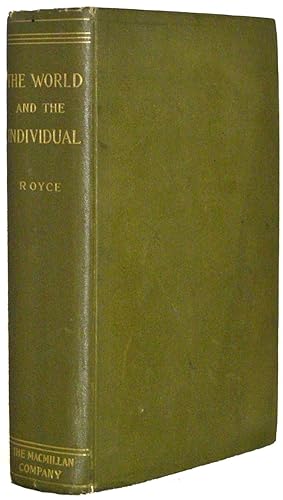Josiah Royce the World and the Individual Gifford Lectures Delivered Before the University of Aberdeen First Series the Four Historical Conceptions of Being (4 results)
FeedbackSearch filters
Product Type
- All Product Types
- Books (4)
- Magazines & Periodicals (No further results match this refinement)
- Comics (No further results match this refinement)
- Sheet Music (No further results match this refinement)
- Art, Prints & Posters (No further results match this refinement)
- Photographs (No further results match this refinement)
- Maps (No further results match this refinement)
- Manuscripts & Paper Collectibles (No further results match this refinement)
Condition
- All Conditions
- New (No further results match this refinement)
- Used (4)
Binding
- All Bindings
- Hardcover (3)
- Softcover (No further results match this refinement)
Collectible Attributes
- First Edition (3)
- Signed (No further results match this refinement)
- Dust Jacket (No further results match this refinement)
- Seller-Supplied Images (3)
- Not Print on Demand (4)
Language (2)
Free Shipping
Seller Location
Seller Rating
-
The World and the Individual: Gifford Lectures Delivered before the University of Aberdeen First series The Four Historical Conceptions of Being
Published by Macmillan, London, 1900
Language: English
Seller: Salsus Books (P.B.F.A.), Kidderminster, United Kingdom
Association Member: PBFA
First Edition
US$ 6.84
Convert currencyUS$ 19.94 shipping from United Kingdom to U.S.A.Quantity: 1 available
Add to basketHardcover. Condition: Poor. 1st Edition. xvi 588pp hardback, green cloth gilt, with some tape repairs to front hinge and torn leaves and some annotation, ownership signatures, reading copy only.
-
THE WORLD AND THE INDIVIDUAL. Gifford Lectures Delivered before the University of Aberdeen. FIRST SERIES: The Four Historical Conceptions Of Being. SECOND SERIES: Nature, Man And The Moral Order. 2 Volumes Compete
Published by The Macmillan Company, New York, 1908
Seller: Frey Fine Books, Rougemont, NC, U.S.A.
Hardcover. Condition: Very Good. Reprint. Reprint, 1908. A Very Good set, 2 Volumes. 8vo., 588, 480 pp. Bound in textured olive cloth with titles in gilt on spine. Top and base of spine rubbed; text edges dusty. Text is clean and unmarked.
-
The World and the Individual: Gifford Lectures Delivered before the University of Aberdeen, in Two Volumes: First Series - The Four Historical Conceptions of Being; Second Series - Nature, Man, and the Moral Order
Published by The Macmillan Company, 1901
Seller: Yesterday's Muse, ABAA, ILAB, IOBA, Webster, NY, U.S.A.
First Edition
Hard Cover. Condition: Very Good. No Jacket. First Edition. 2nd printing of volume 1, first edition, first printing of volume 2. Hinges just beginning to weaken, ink gift note on front endpaper of first volume, front free endpaper of second volume removed. 1901 Hard Cover. xvi, 588, [2]; xx, [2], 480 pp. 8vo. Brown cloth, gilt titles and triple rule, top edge gilt. Royce founded American idealism, and published many works on philosophy and history. In this work he conceptualizes the individual by saying 'to be is to be uniquely related to a whole,' but also that the idealization of our inner purposes enables us to connect them with the purposes of others in a larger whole of which we have no immediate experience: "the real world of our Idealism has to be viewed by us men as a temporal order [in which] purposes are fulfilled, or where finite internal meanings reach their final expression and attain unity with external meanings." Royce was a "versatile Idealist philosopher and teacher whose emphasis on individuality and will, rather than intellect, strongly influenced 20th-century philosophy in the United States. Considering himself an absolute Idealist and borrowing from the works of Hegel, Royce stressed the unity of human thought with the external world. His doctrines were centred on his view of absolute truth, and he declared that everyone must be in agreement with his assertion that such a truth exists, because even those skeptics who would deny this truth automatically affirm it. To deny absolute truth would be to affirm that some 'truthful' statements are possible, and thus the skeptic is caught in a self-contradictory attitude toward the possible existence of 'truth.' Royce's Idealism also extended to religion, the basis of which he conceived to be human loyalty. This 'religion of loyalty' was supplemented by an ethical system that showed his emphasis on the human will. In his words, the highest good would be achieved by 'the willing and practical and thoroughgoing devotion of a person to a cause.' Like the British Idealist F.H. Bradley, whose views resembled his own, Royce enhanced the reputation of European Idealists in his own country. Both men taught a monistic Idealism and helped raise the intellectual standards for philosophical treatment of human problems. Royce's contributions to psychology, social ethics, literary criticism, history, and metaphysics established him as a thinker of widely diverse talents." - Encyclopedia Britannica.
-
FIRST EDITION - INSCRIBED COPY. Half title + TP + Dedication page + vii-xiv = Preface + xv-xvi = Contents + half title + 3-588 + [589]-[590] = Publisher's ads + 1 blank leaf, Octavo. First Edition. First Edition of Royce's 1899 Gifford Lectures - Inscribed by Royce in the Year of Publication. With a gorgeous, large inscription to the front free endpaper: "With best wishes / Josiah Royce / Nov. 5, 1900."Royce's Gifford Lectures were delivered before the University of Aberdeen in January and Feb-ruary of 1899 and are considered to be among his most important writings. The lectures were subtitled First series: The Four Historical Conceptions of Being. These lectures by Royce directly preceded The Varieties of Religious Experience series of Gifford lectures that William James delivered at the University of Edinburgh in 1901-1902. Publisher's original green binding with gilt lettering on the spine. Just the lightest of wear to the spine edges and tips. The final four leaves are uncut. With occasional horizontal and vertical small pencil lines (typically ¼" or so) in the margins. Overall, a beautiful copy of this important book with an equally fine scription. ADDITIONAL PHOTOS AVAILABLE UPON REQUEST.





